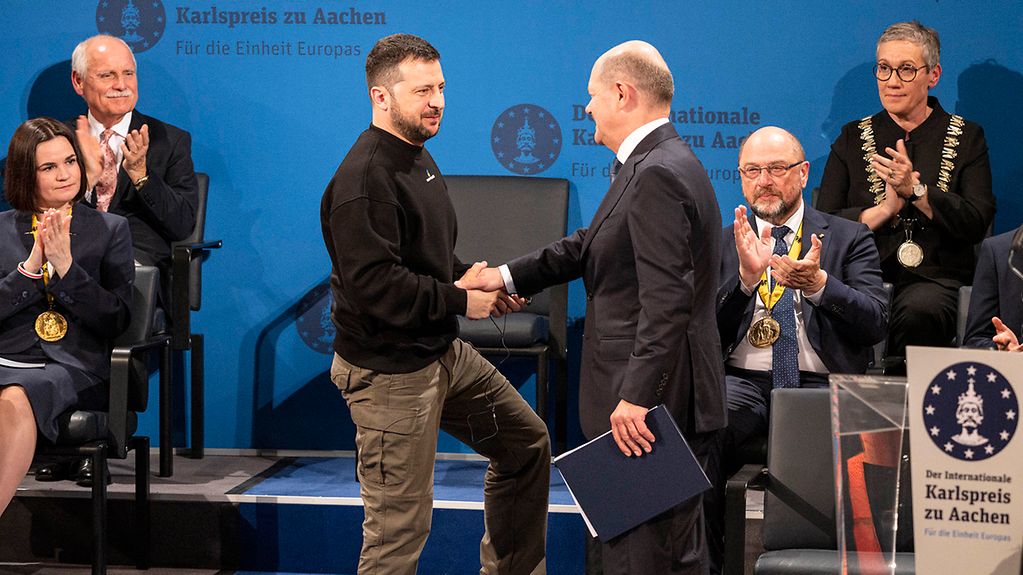Charlemagne Prize awarded to President Zelensky and the Ukrainian People
The Charlemagne Prize has been awarded to President Zelensky and the Ukrainian People. Federal Chancellor Scholz stressed that under the leadership of their president, the Ukrainian people were not only defending their own country, but also the rest of Europe and European values.
3 min reading time

The Charlemagne Prize has been awarded to President Zelensky and the Ukrainian People: "The Ukrainian nation has a long, independent history, its own incredibly diverse culture, its own traditions, and its own identity," said Federal Chancellor Scholz in his speech in Aachen.
Photo: Federal Government/Bergmann
"Europe owes a great deal to the Ukrainian people and more personally to President Volodymyr Zelensky," said Federal Chancellor Scholz in his official speech. As a prize for European citizens, he said, the Charlemagne Prize signified our "profound respect for the bravery and determination of the Ukrainian people and their President".
A member of our European family
For the first time ever, he said, this year's Charlemagne Prize was being awarded to a president and his people, which, he continued, was an extraordinarily wise decision, because both the people of Ukraine, who with outstanding bravery have been defending their country against Russia's brutal aggression, "and you, dear Volodymyr, have been doing extraordinary things together since 24 February 2022".
The Federal Chancellor stressed that Ukraine could count on "our full support through humanitarian, economic, and military materials. But above all, this is a long-term commitment!" The Russian offensive, he said, had brought the European Union and Ukraine closer together than ever before. And, he added, the war had cemented a clear understanding throughout Europe: "Ukraine is a member of the European family".
The Ukrainian nation has its own identity
Russians and Ukrainians, he clarified, were not "one people", as President Putin claimed in his imperialist and colonialist delusion, adding that: "The Ukrainian nation has a long, independent history, its own incredibly diverse culture, its own traditions, and its own identity."
An independent Ukraine had been insisting on its freedom to decide its own path ever since the collapse of the Soviet Union, he said: "and Ukraine has clearly decided in favour of Europe".
Standing up for freedom and democracy, the rule of law, and the protection of human rights
The European Union, Scholz continued, stood for the peaceful coexistence of the European nations, political and economic cooperation between its member states, and the beauty of cultural and linguistic diversity, as well as for freedom and democracy, the rule of law and the protection of human rights, and in particular for the peaceful reconciliation between former enemies. "As the Federal Chancellor of Germany," said Scholz, "I am very well aware of this: and it is this that makes us Europeans."
This, he said, was why we also had to make sure to protect and preserve the values of freedom, democracy and the rule of law within the EU every single day.
The Ukrainian people, he added, also shared this aspiration for democracy, freedom, the rule of law, and Europe. In view of the historic turning point that Russia brought about through this offensive, our message was clear: "Europe stands together and united".
The Charlemagne Prize is the oldest and best-known European prize and is considered one of the highest European awards. First awarded in 1950, it is presented to individuals and institutions who have rendered outstanding services to Europe and European unification. The prize was named after Charlemagne, who is considered the first unifier of Europe.
The Belarusian civil rights activists Maria Kalesnikava, Svetlana Tikhanovskaya, and Veronica Tsepkalo received the prize in 2022. Among others, previous laureates include Jean Monnet, Konrad Adenauer, Robert Schuman, Simone Veil, Angela Merkel and Emmanuel Macron.
The European Charlemagne Youth Prize has been awarded immediately before the Charlemagne Prize proper since 2009 and is awarded in recognition of projects by young people in the field of European and global understanding.